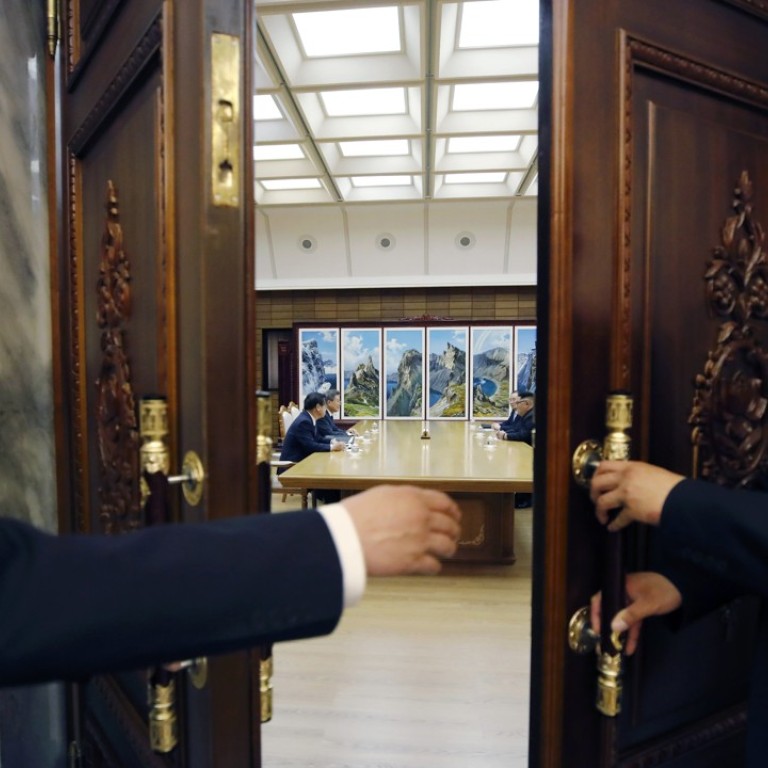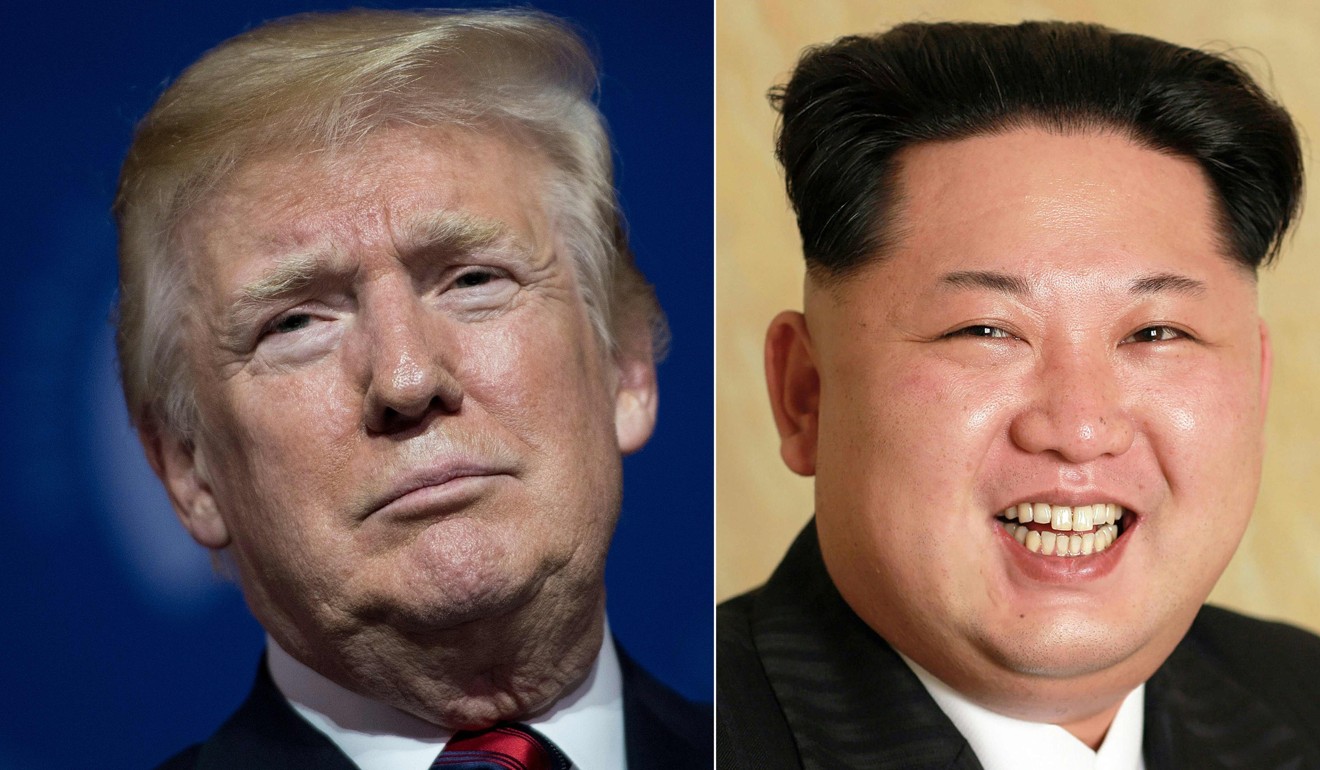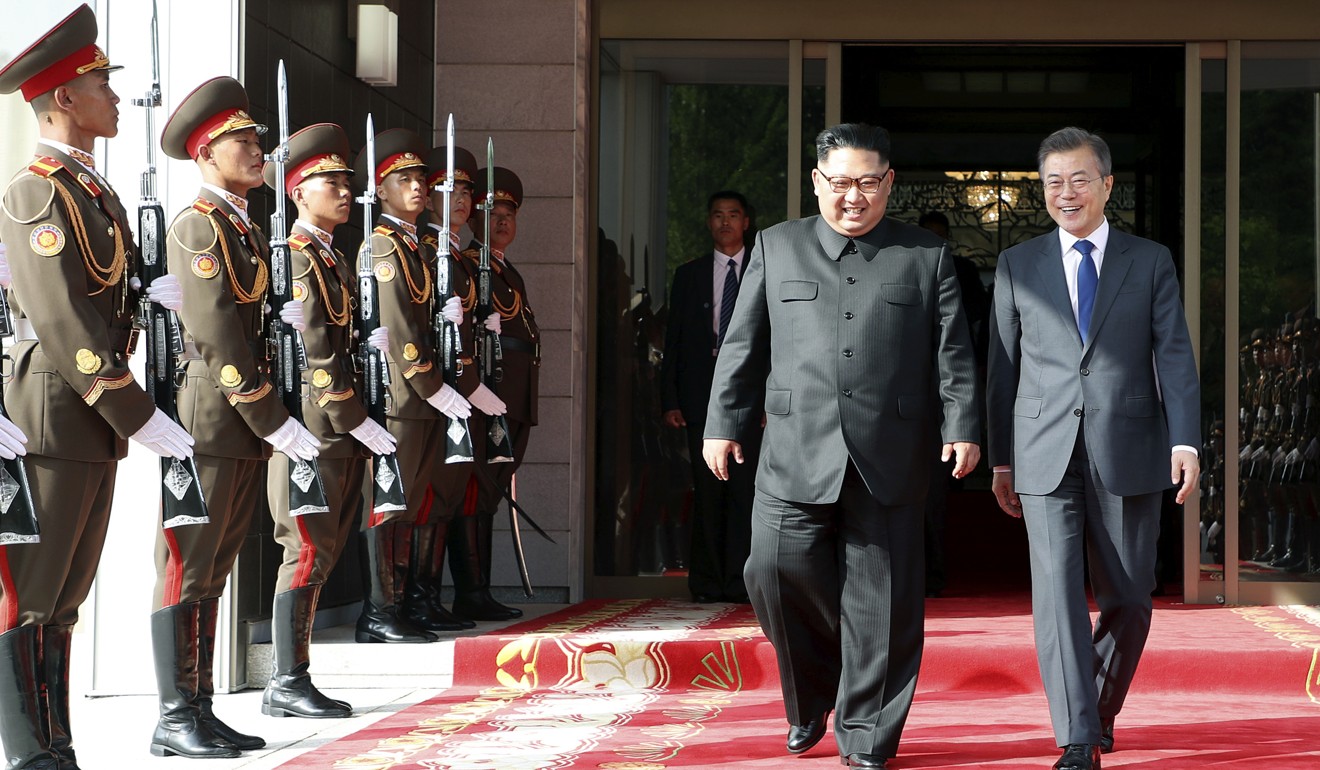
China wishes success for Trump-Kim summit as US and North Korea appear to end days of brinkmanship
A new conciliatory declaration from North Korea came as the White House confirmed it was sending a team to Singapore to prepare for the talks
China said on Sunday it hoped a summit between US President Donald Trump and North Korean leader Kim Jong-un, originally set for Singapore next month, could happen as planned and be successful.
It was the first public reaction from China after Trump said plans for a landmark summit with Kim were moving “very nicely” while South Korea’s leader said Kim told him the talks would be a historic opportunity to end decades of confrontation.
Meanwhile, The Washington Post reported that a group of US officials crossed into North Korea on Sunday for talks on preparations for the summit. The newspaper, citing a person familiar with the arrangements, said Sung Kim, the former US ambassador to South Korea, was summoned from his current post in the Philippines to lead the preparations.
The latest notes from Beijing, Washington, Seoul and Pyongyang capped a turbulent few days of diplomatic brinkmanship on the Korean Peninsula that had sent tensions soaring. But it remains to be seen whether North Korea would commit to “complete, verifiable and irreversible denuclearisation” as demanded by Washington.
Trump rattled the region on Thursday by cancelling a planned June 12 meeting with Kim in Singapore, citing “open hostility” from Pyongyang.
But within 24 hours he reversed course, saying it could still go ahead after productive talks were held with North Korean officials.
“It’s moving along very nicely,” Trump told reporters late on Saturday when asked for an update. “We’re looking at June 12 in Singapore. That hasn’t changed.”
He added: “We can be successful in the denuclearisation of the Korean Peninsula, that could be a great thing for North Korea, it would be a great thing for South Korea, it would be great for Japan, it would be great for the world, it would be great for the United States, it would be great for China.”

Trump’s unpredictability sparked a surprise meeting on Saturday between Kim and South Korean President Moon Jae-in – only the fourth time leaders from the two countries have ever met – as they scrambled to get the talks back on track.
Pictures showed them shaking hands and embracing on the North Korean side of the demilitarised zone separating the two nations.
Moon said Kim reached out to him to arrange the hasty meeting “without any formality”.
There the North Korean leader described the Singapore summit as a landmark opportunity to end decades of confrontation.
“He … expressed his intention to put an end to the history of war and confrontation through the success of the North-US summit and to cooperate for peace and prosperity,” Moon told reporters in Seoul on Sunday.
Pyongyang’s state-run KCNA news agency said Kim “expressed his fixed will on the historic DPRK-US summit talks”, using the official abbreviation for North Korea.
Kim said the two Koreas should “positively cooperate with each other as ever to improve the DPRK-US relations and establish mechanism for permanent and durable peace,” KCNA added, saying South and North Korea would hold another round of “high-level” talks on June 1.
During his two hour meeting with Kim, Moon said he urged both Washington and Pyongyang “to remove misunderstandings through direct communication and to have sufficient dialogue in advance through working-level negotiations on the agendas to be agreed upon at the summit”.
“Chairman Kim agreed on that,” he added.
Moon said the Pyongyang regime reaffirmed its commitment to give up its nuclear weapons but had its own security concerns if it took that step.
“Kim stressed again that he had a firm determination towards complete denuclearisation,” the South Korean president added.
“The thing he was uncertain about was not denuclearisation but concerns on whether he could trust that the US would end its hostile policy and guarantee the security of his regime when the North denuclearises itself.”

Moon said he wished to hold a three-way summit with Trump and Kim should their upcoming bilateral meeting succeed.
“Should the North Korea-US summit succeed, I would like to see efforts to formally end the (Korean) war through a three-way summit of the South, the North and the US,” he said.
It was unclear what role China would play in such a summit.
The Korean war ended in 1953 in a truce after an armistice was signed by China, US and North Korea, but no formal peace agreement was made.
Two Koreas pledged at Panmumjom last month that they will work together to officially end the Korean war sometime this year.
Chinese Foreign Ministry spokesman Lu Kang on Sunday said that Beijing appreciated the “relevant countries’ attitudes on the denuclearisation of the Korean Peninsula and their will to secure regional peace and stability,” according to Yonhap.
“China will continue to play an active and constructive role in the Korean Peninsula issue.
“As a close neighbour, China has consistently maintained its goal to maintain peace and stability on the Korean Peninsula and resolving the issues through dialogue and negotiation.”
Rorry Daniels, an expert of foreign affairs in Asia, said negotiations between the United States and North Korea might reach a deadlock even if their summit was held, given that they were unlikely to come to a compromise about how to attain denuclearisation.
“The key question of the current efforts at diplomacy is whether security guarantees can be offered to North Korea before the complete and verified dismantlement of their nuclear programme,” Daniels said. “It would not serve US interests to provide North Korea economic and other incentives without a reciprocal effort by North Korea to declare their nuclear capabilities and take steps to verify the programme’s freeze and eventual dismantlement.”
Troy Stangarone, a senior director at the Korea Economic Institute in Washington said that to strike a deal with North Korea, the United States may adopt an approach similar to that used to resolve the Cuban Missile Crisis in 1962.
“The United States gave Cuba assurances that it would not invade and has stood by those assurances,” he said, referring to a pledge Washington made to Havana in return for the removal of nuclear missiles introduced into the island by the Soviet Union.
“It is unclear whether assurances similar to those given to Cuba would be satisfactory to North Korea, or if it will seek something more formal such as a non-aggression pact.”
Gist of summit talks between two Koreas
● North Korea leader Kim Jong-un expresses his “fixed will” to hold talks with US President Donald Trump.
● Tells South Korea President Moon Jae-in the two Koreas should “positively cooperate with each other” to improve US-North Korea relations.
● Kim thanks Moon for efforts for US-North Korea summit “scheduled for June 12”.
Moon, Kim agree to:
● Hold high-level talks between officials of two Koreas on June 1.
● Make efforts to achieve denuclearisation on Korean Peninsula.
● Continue to hold talks.
Reuters, Associated Press, Agence France-Presse, Kyodo

